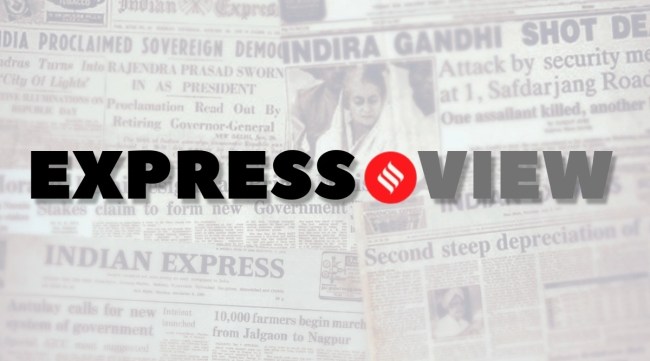Opinion Amit Shah’s visit: Listening in Jammu and Kashmir
To bring the peace, development and welfare that the Modi government promises, it is time to hold an assembly election in Jammu and Kashmir. The sooner the better
 Amit Shah struck a positive note when he said he would listen to Kashmiris. The people of the erstwhile state are waiting to be heard.
Amit Shah struck a positive note when he said he would listen to Kashmiris. The people of the erstwhile state are waiting to be heard. Union Home Minister Amit Shah’s first public rallies in Rajouri in Jammu and Baramulla in Kashmir were well attended. Both areas have a significant Pahari population and the announcement that Scheduled Tribe status would be extended to the community has clearly gone down well here. For the rest, his message seemed to fall back on the unvarying tropes of Pakistan and Kashmir’s “three families”. In its apparent sameness, Minister Shah’s rhetoric seems not to account for the fact that realities have changed quite significantly on the ground in Kashmir and vis a vis Pakistan — even if no politician in Pakistan will admit this openly, the country in which the slogan used to be “Kashmir banega Pakistan” the talk is now, more, of statehood for J&K within the Indian Union. Pakistan’s cross-border activities are no longer what they used to be. It is also not entirely accurate that Delhi no longer engages with Pakistan on Kashmir — the ceasefire on the Line of Control came after months, if not years, of back channel negotiations between the two sides, and is a boon for the people of Rajouri which Shah visited, as it was for other places in the line of fire. Of course, the “three families” of Kashmir may still seem stuck in an older groove. But the reality also is that the Centre has been an accomplice — or an adversary — complicit in many of their errors of commission and omission. To blame politicians, as Shah did, for all the deaths in the Valley due to terror and militancy is, plain, wrong. Anyway, these three families have been relegated to the margins in the shifting political landscape in Jammu and Kashmir.
Shah struck a positive note when he said he would listen to Kashmiris. The people of the erstwhile state are waiting to be heard. On his last visit to Kashmir in October 2021, Shah made a similar promise, but so far, neither he nor anyone else in the Modi government has shown signs of readiness to engage with the Kashmiri people and to listen to them. Under the J&K Administration, run by Shah’s ministry, the communication appears to be top-down. Even among Kashmiri Pandits, who believed they had a natural ally in the BJP, there is a growing sense that they have not been given a hearing. The Home Minister must make clear what kind of engagement he has in mind in Kashmir and with whom. The media could have provided a forum for a dialogue between government and the people but three years of restrictions have had a chilling effect and severely eroded their autonomy. Civil society leaders have also retreated from public spaces.
Especially in these circumstances, where the executive is domineering and other spaces and institutions are constrained and constricted, there is no better way to listen to the people than through an election. A local bodies election after which the winners do not feel secure enough to step outside their safe houses, is not an answer. To bring the peace, development and welfare that the Modi government promises, it is time to hold an assembly election in Jammu and Kashmir. The sooner the better.






